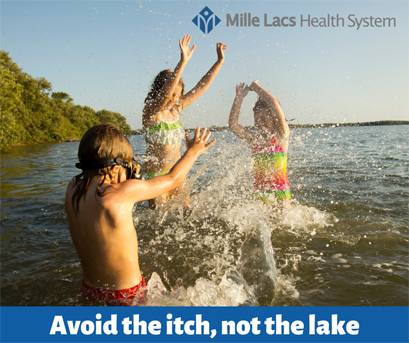Avoid the itch, not the lake
July 19, 2022
Don’t let the fear of a little itch keep you out of the lake this summer. This article will help you identify things to look out for at the lake, steps you can take to help prevent “swimmers itch,” and ways to treat it if it does end up finding you.
Swimmer's itch is an itchy rash that can occur after you go swimming or wading outdoors. The rash usually looks like reddish pimples or blisters. The rash can appear within minutes, or even days later. Swimmer's itch is caused by an allergic reaction to parasites that burrow into your skin while you're swimming or wading in warm water.
The parasites that cause swimmers’ itch normally live in waterfowl, snails, and some mammals. Humans are not suitable hosts, so the parasites soon die after getting under your skin. Some people are more sensitive to swimmers’ itch than others, and your sensitivity can increase each time you're exposed.
Swimmer's itch isn't contagious from person to person, so you don't need to worry about catching swimmer's itch from someone who has the itchy rash.
One of the biggest prevention methods is to “protect” your skin. Swimmer's itch usually affects only exposed skin — skin not covered by swimsuits. Applying waterproof sunscreen can not only protect your exposed skin from the damaging rays of the sun, but it has also been known to add a layer of protection from the parasites that cause swimmers itch.
Other steps to take to avoid swimmers’ itch include: avoiding marshy areas, and shallow water. Rinse exposed skin with clean water immediately after leaving the water, then vigorously dry your skin with a towel. Launder your swimsuits often.
Swimmer's itch is uncomfortable, but it usually clears up in a few days. In the meantime, you can control itching with over-the-counter medications such as calamine lotion, or an anti-itch cream like hydrocortisone. Over-the-counter antihistamines like Benadryl, or a cool wet compress will also help relieve the itch.
Swimmer's itch rarely leads to complications, but your skin can become infected if you scratch too vigorously. Consult with your medical provider if your rash lasts more than three days, or if you notice pus at the site of the rash.
